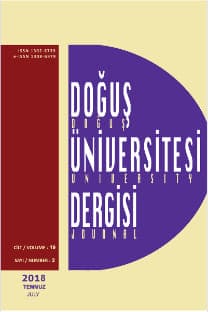İstanbul menkul kıymetler borsasında ocak ayı etkisi
Effect in Istanbul stock exchange
___
- CHEN, H. (2004). All things considered, taxes drive the January effect, The Journal of Financial Research, Vol. XXVII, No. 3, 351–372.
- CHEUNG, K.C. ve COUTTS, J.A. (1999). The January effect and monthly seasonality in the Hang Seng index: 1985-97, Applied Economics Letters, 6, 121-123.
- CHOUDHRY, T. (2001). Month of the year effect and January effect in pre-WWI stock returns: Evidence from a nonlinear Garch model, International Journal of Finance and Economics, 6, 1-11.
- COUTTS, J.A., SHEIKH M.A. (2002). The anomalies that aren’t there: the weekend, January and pre-holiday effects on the all gold index on the Johannesburg Stock Exchange 1987-1997, Applied Financial Economics, 12, 863-871.
- FAMA, E. (1965) The behavior of stock markets prices, Journal of Business, 38, 34-105.
- FOUNTAS, S., SEGREDAKIS, K.N. (2002). Emerging stock markets return seasonalities: the January effect and the tax-loss selling hypothesis, Applied Financial Economics, 12, 291-299.
- GU, A.Y., SIMON J.T. (2003). Declining January Effect-Experience in the United Kingdom, American Business Review, June, 117-121.
- MEHDIAN S., PERRY, M.J. (2002). Anomalies in US equity markets: a reexamination of the January effect, Applied Financial Economics, 12,141-145.
- RAJ, M., THURSTON, D. (1994). January or April? Test of the turn of the year effect in the New Zealand stock market, Applied Economics Letters, 1, 81-83.
- 193 sayılı Gelir vergisi kanunu; www.gelirler.gov.tr [Erişim tarihi: 12.03.2007].
- 257’nolu Gelir vergisi genel tebliği; www.gelirler.gov.tr [Erişim tarihi: 12.03.2007].
- 258’nolu Gelir vergisi genel tebliği; www.gelirler.gov.tr [Erişim tarihi: 12.03.2007].
- 260’nolu Gelir vergisi genel tebliği; www.gelirler.gov.tr [Erişim tarihi: 12.03.2007].
- 22.07.2006 tarih ve 2006/10731 sayılı Bakanlar Kurulu Kararı; www.gelirler.gov.tr [Erişim tarihi: 12.03.2007] .
- ISSN: 1302-6739
- Yayın Aralığı: Yılda 2 Sayı
- Başlangıç: 2000
- Yayıncı: Doğuş Üniversitesi
İSTANBUL MENKUL KIYMETLER BORSASINDA OCAK AYI ETKİSİ
Yatırım fonlarının risk odaklı performans değerlemesi
Suat TEKER, Emre KARAKURUM, Osman TAV
RÜZGAR HIZI DAĞILIMININ TAHMİN EDİLMESİ İÇİN İSTATİSTİKSEL BİR YAKLAŞIM: GELİBOLU BÖLGESİ ÖRNEĞİ
Rüzgar hızı dağılımının tahmin edilmesi için istatistiksel bir yaklaşım: Gelibolu bölgesi örneği
Beynin algılama süreci, yazma ve kümeleme stratejisi
Türkiye’de konut fiyatlarının belirleyicileri: Hedonik regresyon modeli
III. Sütuna ilişkin ilk ön karar davası - gözütok ve brügge kararına ilişkin bir değerlendirme
Hakan TAŞDEMİR, Pınar A GİRGİN
BANKA SERMAYE YETERLİLİĞİNDE BASEL II YAKLAŞIMI VE TÜRK BANKACILIĞI
III. SÜTUNA İLİŞKİN İLK ÖN KARAR DAVASI-GÖZÜTOK ve BRÜGGE KARARINA İLİŞKİN BİR DEĞERLENDİRME
Hakan TAŞDEMİR, A. Pınar GİRGİN
ALGILANAN GÜÇLENDİRMENİN İŞGÖREN PERFORMANSI ÜZERİNE ETKİLERİ
